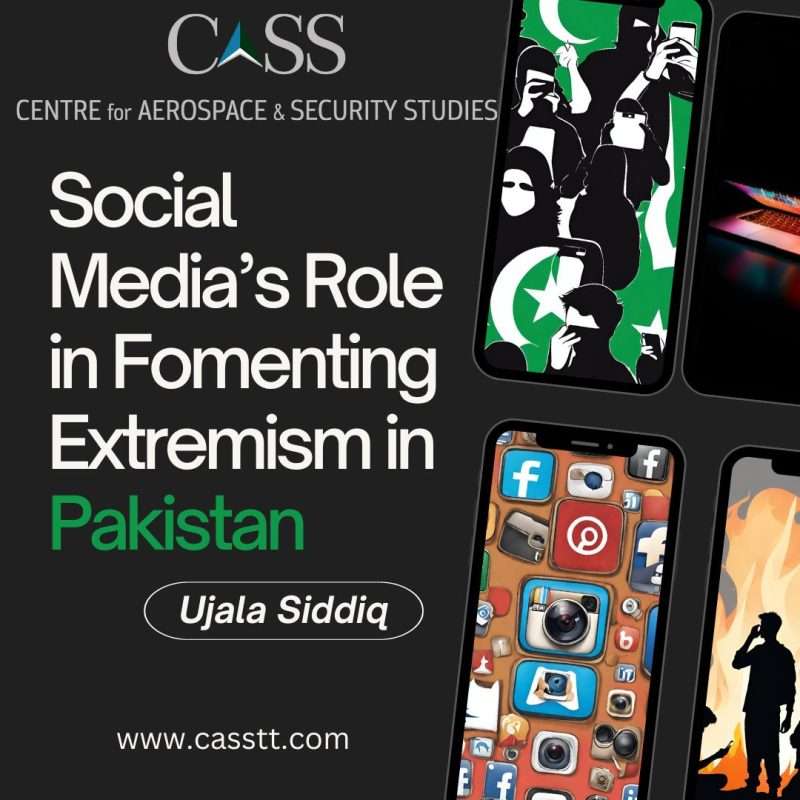In this era of information warfare, rapid communication tools, such as Facebook, Skype, Text, Instagram, Linkedin, Twitter, and WhatsApp, are frequently exploited by adversaries for communication and data sharing. Oxford Internet Institute reported that these platforms empower various entities to manipulate public opinion, challenge opposing narratives, and spread deceptive information to achieve political objectives in foreign nations. UNESCO Digital Library explains that the algorithms implemented by social media platforms notably contribute to the propagation of extremist content. Such algorithms are crafted to emphasise engaging and contentious posts due to their ability to increase user interaction and advertisement revenue.
As a result, inflammatory and divisive content often gains greater exposure compared to narratives endorsing peace and unity. This phenomenon has been evident in online interactions involving various stakeholders in Pakistan. It poses a threat to national and internal security as it can fuel tensions, exacerbate divisions, and potentially lead to unrest and instability within the country. Threats to peace can vary from minor public disturbances to widespread violence or even full-fledged insurrections. Internal security challenges can target a state’s citizens, its institutional structures, or its infrastructure. These challenges can manifest as minor crimes, organised criminal activities, political disturbances, industrial conflicts, or domestic terrorist acts. Additionally, external nations can pose threats to a country’s internal security by either directly engaging in or sponsoring acts of terrorism or rebellion, all without an official declaration of war.
Without appropriate legal management, social media risks disrupting the information landscape. The Arab Spring in the Middle East and Africa serves as an example, where platforms like Twitter and Facebook were primarily utilised to promote anti-state sentiments. Hence, in many contexts, especially in Pakistan as well, social media is increasingly viewed as a potential risk to national security and democracy. There have been 71.70 million social media users in Pakistan as of January 2023, according to Datareportal. This number represented 30.1% of the country’s population at that time, underscoring the significance of social media platforms in shaping political narratives through the rapid dissemination of information.
The News reported that FIA identified approximately 2,100 Twitter accounts as part of a disinformation campaign targeting state institutions with an aim to drive a wedge between the state and citizens. In such cases, efforts by Law Enforcement Agencies for national security are paramount. A primary reason for the increase in anti-state material on social media is the absence of stringent regulation and monitoring on these platforms. Due to minimal oversight, individuals with extremist views can spread their harmful ideologies while maintaining anonymity. Consequently, unverified narratives become prevalent without thorough fact-checking or validation.
Various measures have been implemented to address online extremism in Pakistan. The Pakistan Telecommunication Authority (PTA) established the Cyber Vigilance Division, which is playing a crucial role in monitoring and addressing extremist online behaviours. This Division works in tandem with technology firms and law enforcement to identify, eliminate, or restrict accounts that promote hate or incite violence. Furthermore, countering extremist ideologies involves crafting narratives that oppose such extremist beliefs. Additionally, it is essential to educate the public on the perils of online extremism. Initiatives that spotlight the misleading strategies of extremists can enable individuals to critically assess content on social media. Fostering media literacy among the population can lead to a society better equipped against external influences and radicalisation.
Meanwhile, collaboration among civil society groups, educational institutions, religious leaders, and influential individuals can help disseminate messages of peace, acceptance, and national cohesion via social media endeavours. A notable example of such collaboration occurred when leading Pakistani celebrities initiated the ‘United against Extremism’ campaign. Through impactful video narratives shared across various platforms, they emphasised the importance of rejecting polarising beliefs and celebrating the diversity that enriches Pakistan. These collective efforts serve as a testament to the potential for positive change in online spaces and the promotion of a more inclusive and harmonious society.
Ujala Siddiq is a Research Assistant at the Centre for Aerospace & Security Studies (CASS), Islamabad, Pakistan. She can be reached at cass.thinkers@casstt.com
Design Credit: Mysha Dua Salman




